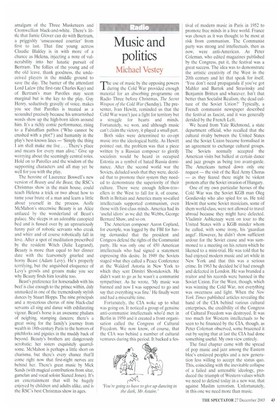Music and politics
Michael Vestey
rrhe use of music by the opposing powers 1 during the Cold War provided enough material for an absorbing programme on Radio Three before Christmas, The Secret Weapon of the Cold War (Sunday). The presenter, Ivan Hewitt, reminded us that the Cold War wasn't just a fight for territory but a struggle for hearts and minds. Fortunately, we won, and although music can't claim the victory, it played a small part.
Both sides were determined to co-opt music into the ideological battle. As Hewitt pointed out, the problem was that a piece written by a Russian composer to glorify socialism would be heard in occupied Estonia as a symbol of hated Russia dominance. After the second world war the Soviets, deluded souls that they were, decided that to promote their system they needed to demonstrate the superiority of their culture. There were enough fellow-travellers in the West to fall for it, of course. Both in Britain and America many so-called intellectuals supported communism, even those with first-class minds. America had its 'useful idiots' as we did: the Webbs, George Bernard Shaw, and so on.
The Americancomposer Aaron Copland, for example, was logged by the FBI for having demanded that the president and Congress defend the rights of the Communist party. He was only one of 450 American intellectuals who had signed a statement expressing this desire. In 1949 the Soviets staged what they called a Peace Conference at the Waldorf Astoria in New York to which they sent Dimitri Shostakovich. He didn't want to go as he wasn't a communist sympathiser. As he wrote, 'My music was banned and now I was supposed to go and say that everything was fine.' He finally went and had a miserable time.
Fortunately, the CIA woke up to what was going on. It noticed a group of genuine anti-communist intellectuals who'd met in Berlin in 1950 and it created a front organisation called the Congress of Cultural Freedom. We now know, of course, that the CIA was behind a number of cultural ventures during this period. It backed a fes tival of modern music in Paris in 1952 to promote free minds in a free world. France was chosen as it was thought to be most at risk from communism. The Communist party was strong and intellectuals, then as now, were anti-American. As Peter Coleman, who edited magazines published by the Congress, put it, the festival was a great success. The idea was to demonstrate the artistic creativity of the West in the 20th century and let that speak for itself. 'You don't need propaganda if you've got Mahler and Bartok and Stravinsky and Benjamin Britten and whatever. Isn't that better than Socialist Realism, the dead culture of the Soviet Union?' Typically, a French communist newspaper described the festival as fascist, and it was generally derided by the French Left.
We heard from Yale Richmond, a state department official, who recalled that the cultural rivalry between the United States and the Soviet Union became formalised in an agreement to exchange cultural groups. The Soviets normally accepted the American visits but balked at certain dance and jazz groups as being too avant-garde. The Americans turned down only one request — the visit of the Red Army Chorus — as they feared there might be violent protests after the Soviet invasion of Hungary.
One of my own particular heroes of the Cold War was the Soviet KGB man Oleg Gordievsky who also spied for us. He told Hewitt that some Soviet musicians, some of them world-class, were not allowed to travel abroad because they might have defected. Vladimir Ashkenazy went on tour to the United States with a KGB minder whom he called, with some irony, his 'guardian angel'. However, he didn't show sufficient ardour for the Soviet cause and was summoned to a meeting on his return which he likened to a mini-trial. He was told that he had enjoyed modern music and art while in New York and that this was a serious crime. In 1963 he decided he'd had enough and defected in London. He was branded a traitor and his records were banned in the Soviet Union. For the West, though, which was winning the Cold War, not everything was sweetness and light. When the New York Times published articles revealing the hand of the CIA behind various cultural enterprises, the credibility of the Congress of Cultural Freedom was destroyed. It was too much for Western intellectuals to be seen to be financed by the CIA, though, as Peter Coleman observed, some brazened it out by saying that at last the CIA had done something useful. My own view entirely.
The final chapter came with the spread of pop music and jazz among the Eastern bloc's enslaved peoples and a new generation less willing to accept the status quo. This, coinciding with the inevitable collapse of a failed and untenable ideology, produced the triumph of Western values which we need to defend today in a new war, that against Muslim terrorism. Unfortunately, in this one we need more than music.


























































 Previous page
Previous page